LAWS11030 Business Law Assignment: Case Analysis and Studies
VerifiedAdded on 2022/10/18
|11
|2627
|355
Homework Assignment
AI Summary
This business law assignment solution analyzes the case of Ford & Anor v La Forrest [2001] QSC 261, focusing on contract formation, the Electronic Transactions Act, and the intention of parties. It examines whether acceptance via email constitutes a valid contract. The assignment further delves into case studies, exploring issues such as family agreements and contractual intent in the context of Errington v Errington Woods. The solution also covers concepts of unconscionability and undue influence, drawing from cases like Commercial Bank of Australia Ltd v Amadio and Royal Bank of Scotland plc v Etridge. Finally, the assignment addresses Australian Consumer Law, specifically Section 64 of the Competition and Consumer Act 2010 regarding guarantees and the exclusion of liability, using the scenario of Sydney Cleaners Pty. Ltd and Susan's wedding dress. The document provides a comprehensive overview of these legal principles.
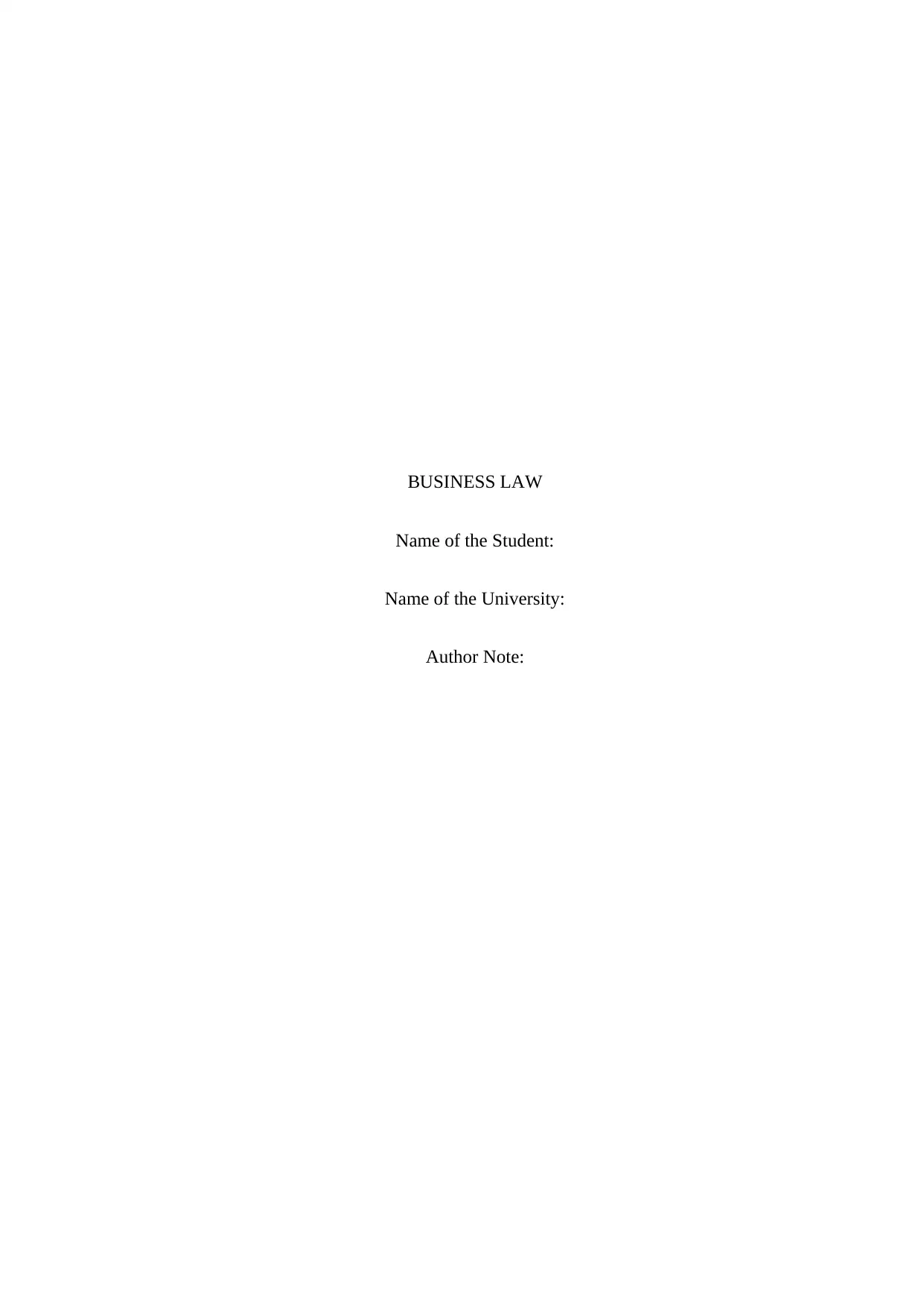
BUSINESS LAW
Name of the Student:
Name of the University:
Author Note:
Name of the Student:
Name of the University:
Author Note:
Paraphrase This Document
Need a fresh take? Get an instant paraphrase of this document with our AI Paraphraser
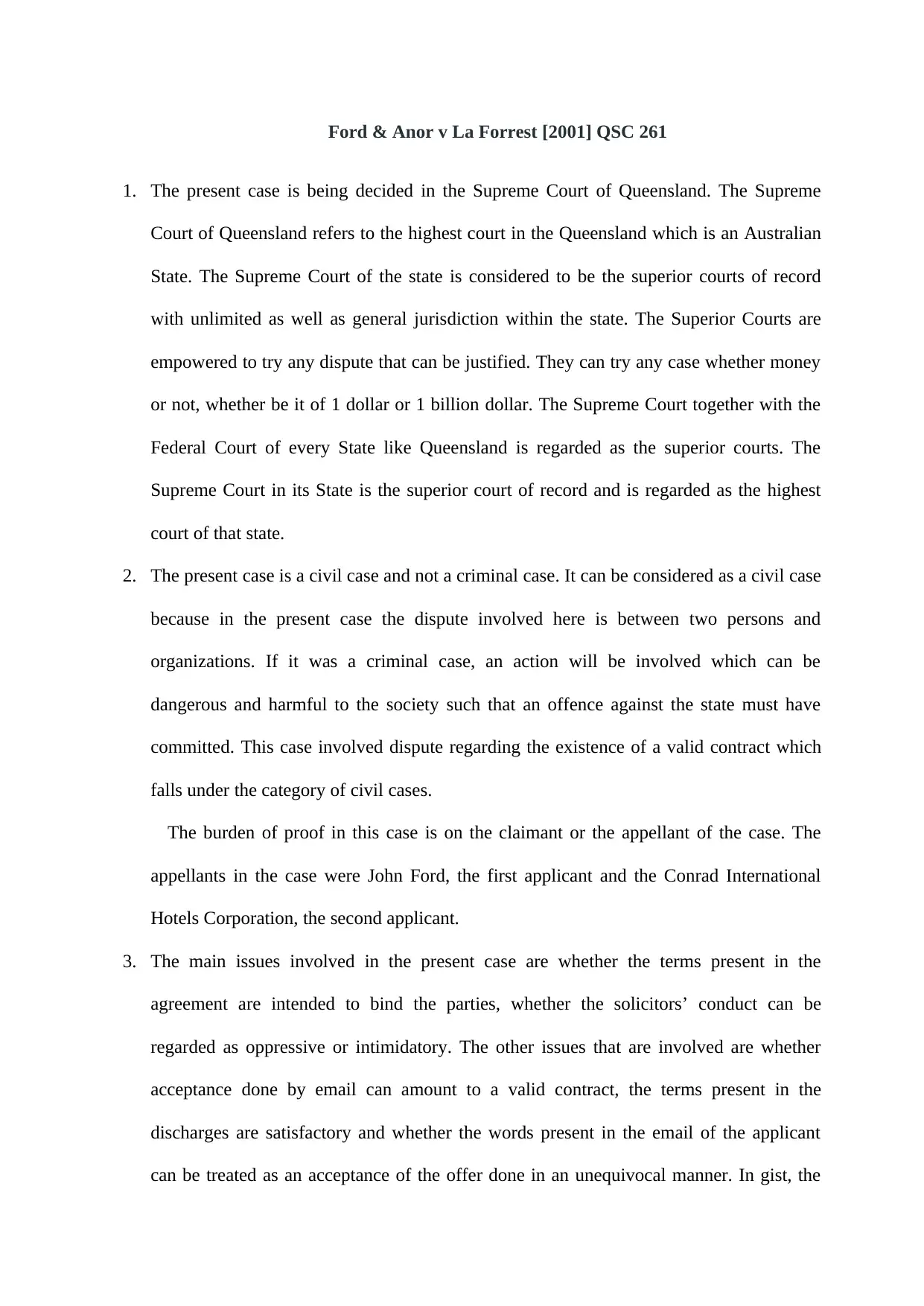
Ford & Anor v La Forrest [2001] QSC 261
1. The present case is being decided in the Supreme Court of Queensland. The Supreme
Court of Queensland refers to the highest court in the Queensland which is an Australian
State. The Supreme Court of the state is considered to be the superior courts of record
with unlimited as well as general jurisdiction within the state. The Superior Courts are
empowered to try any dispute that can be justified. They can try any case whether money
or not, whether be it of 1 dollar or 1 billion dollar. The Supreme Court together with the
Federal Court of every State like Queensland is regarded as the superior courts. The
Supreme Court in its State is the superior court of record and is regarded as the highest
court of that state.
2. The present case is a civil case and not a criminal case. It can be considered as a civil case
because in the present case the dispute involved here is between two persons and
organizations. If it was a criminal case, an action will be involved which can be
dangerous and harmful to the society such that an offence against the state must have
committed. This case involved dispute regarding the existence of a valid contract which
falls under the category of civil cases.
The burden of proof in this case is on the claimant or the appellant of the case. The
appellants in the case were John Ford, the first applicant and the Conrad International
Hotels Corporation, the second applicant.
3. The main issues involved in the present case are whether the terms present in the
agreement are intended to bind the parties, whether the solicitors’ conduct can be
regarded as oppressive or intimidatory. The other issues that are involved are whether
acceptance done by email can amount to a valid contract, the terms present in the
discharges are satisfactory and whether the words present in the email of the applicant
can be treated as an acceptance of the offer done in an unequivocal manner. In gist, the
1. The present case is being decided in the Supreme Court of Queensland. The Supreme
Court of Queensland refers to the highest court in the Queensland which is an Australian
State. The Supreme Court of the state is considered to be the superior courts of record
with unlimited as well as general jurisdiction within the state. The Superior Courts are
empowered to try any dispute that can be justified. They can try any case whether money
or not, whether be it of 1 dollar or 1 billion dollar. The Supreme Court together with the
Federal Court of every State like Queensland is regarded as the superior courts. The
Supreme Court in its State is the superior court of record and is regarded as the highest
court of that state.
2. The present case is a civil case and not a criminal case. It can be considered as a civil case
because in the present case the dispute involved here is between two persons and
organizations. If it was a criminal case, an action will be involved which can be
dangerous and harmful to the society such that an offence against the state must have
committed. This case involved dispute regarding the existence of a valid contract which
falls under the category of civil cases.
The burden of proof in this case is on the claimant or the appellant of the case. The
appellants in the case were John Ford, the first applicant and the Conrad International
Hotels Corporation, the second applicant.
3. The main issues involved in the present case are whether the terms present in the
agreement are intended to bind the parties, whether the solicitors’ conduct can be
regarded as oppressive or intimidatory. The other issues that are involved are whether
acceptance done by email can amount to a valid contract, the terms present in the
discharges are satisfactory and whether the words present in the email of the applicant
can be treated as an acceptance of the offer done in an unequivocal manner. In gist, the
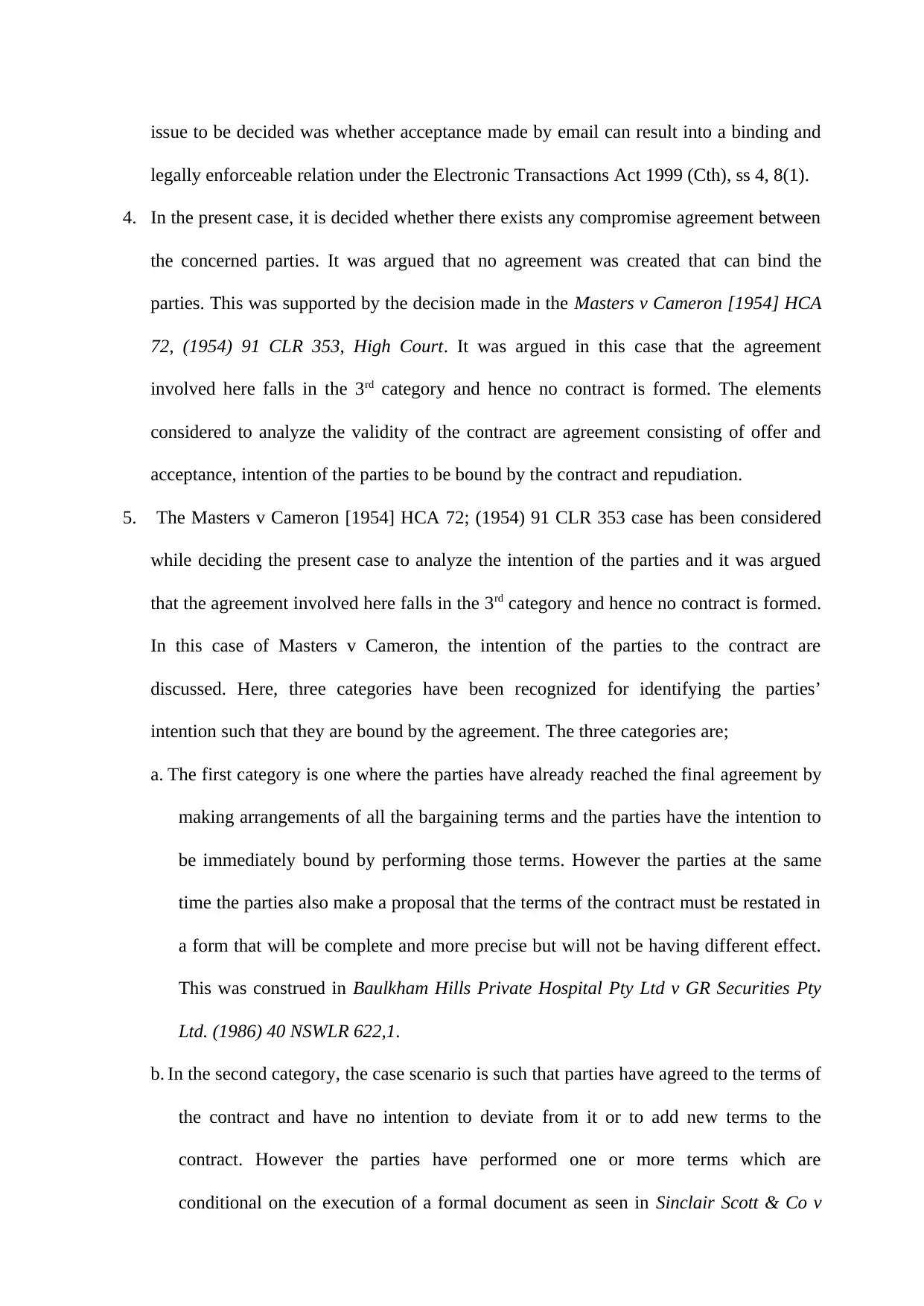
issue to be decided was whether acceptance made by email can result into a binding and
legally enforceable relation under the Electronic Transactions Act 1999 (Cth), ss 4, 8(1).
4. In the present case, it is decided whether there exists any compromise agreement between
the concerned parties. It was argued that no agreement was created that can bind the
parties. This was supported by the decision made in the Masters v Cameron [1954] HCA
72, (1954) 91 CLR 353, High Court. It was argued in this case that the agreement
involved here falls in the 3rd category and hence no contract is formed. The elements
considered to analyze the validity of the contract are agreement consisting of offer and
acceptance, intention of the parties to be bound by the contract and repudiation.
5. The Masters v Cameron [1954] HCA 72; (1954) 91 CLR 353 case has been considered
while deciding the present case to analyze the intention of the parties and it was argued
that the agreement involved here falls in the 3rd category and hence no contract is formed.
In this case of Masters v Cameron, the intention of the parties to the contract are
discussed. Here, three categories have been recognized for identifying the parties’
intention such that they are bound by the agreement. The three categories are;
a. The first category is one where the parties have already reached the final agreement by
making arrangements of all the bargaining terms and the parties have the intention to
be immediately bound by performing those terms. However the parties at the same
time the parties also make a proposal that the terms of the contract must be restated in
a form that will be complete and more precise but will not be having different effect.
This was construed in Baulkham Hills Private Hospital Pty Ltd v GR Securities Pty
Ltd. (1986) 40 NSWLR 622,1.
b. In the second category, the case scenario is such that parties have agreed to the terms of
the contract and have no intention to deviate from it or to add new terms to the
contract. However the parties have performed one or more terms which are
conditional on the execution of a formal document as seen in Sinclair Scott & Co v
legally enforceable relation under the Electronic Transactions Act 1999 (Cth), ss 4, 8(1).
4. In the present case, it is decided whether there exists any compromise agreement between
the concerned parties. It was argued that no agreement was created that can bind the
parties. This was supported by the decision made in the Masters v Cameron [1954] HCA
72, (1954) 91 CLR 353, High Court. It was argued in this case that the agreement
involved here falls in the 3rd category and hence no contract is formed. The elements
considered to analyze the validity of the contract are agreement consisting of offer and
acceptance, intention of the parties to be bound by the contract and repudiation.
5. The Masters v Cameron [1954] HCA 72; (1954) 91 CLR 353 case has been considered
while deciding the present case to analyze the intention of the parties and it was argued
that the agreement involved here falls in the 3rd category and hence no contract is formed.
In this case of Masters v Cameron, the intention of the parties to the contract are
discussed. Here, three categories have been recognized for identifying the parties’
intention such that they are bound by the agreement. The three categories are;
a. The first category is one where the parties have already reached the final agreement by
making arrangements of all the bargaining terms and the parties have the intention to
be immediately bound by performing those terms. However the parties at the same
time the parties also make a proposal that the terms of the contract must be restated in
a form that will be complete and more precise but will not be having different effect.
This was construed in Baulkham Hills Private Hospital Pty Ltd v GR Securities Pty
Ltd. (1986) 40 NSWLR 622,1.
b. In the second category, the case scenario is such that parties have agreed to the terms of
the contract and have no intention to deviate from it or to add new terms to the
contract. However the parties have performed one or more terms which are
conditional on the execution of a formal document as seen in Sinclair Scott & Co v
⊘ This is a preview!⊘
Do you want full access?
Subscribe today to unlock all pages.

Trusted by 1+ million students worldwide
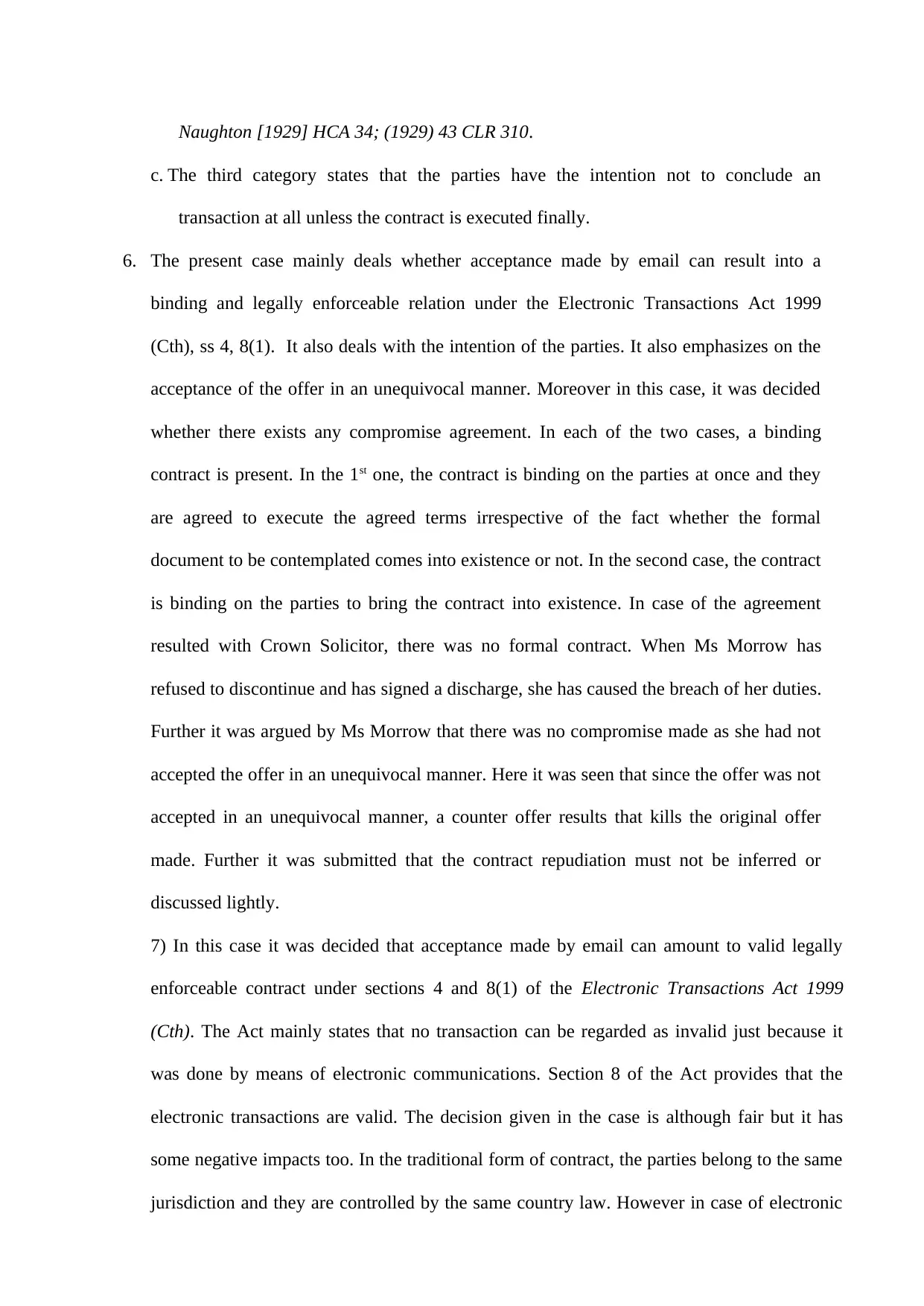
Naughton [1929] HCA 34; (1929) 43 CLR 310.
c. The third category states that the parties have the intention not to conclude an
transaction at all unless the contract is executed finally.
6. The present case mainly deals whether acceptance made by email can result into a
binding and legally enforceable relation under the Electronic Transactions Act 1999
(Cth), ss 4, 8(1). It also deals with the intention of the parties. It also emphasizes on the
acceptance of the offer in an unequivocal manner. Moreover in this case, it was decided
whether there exists any compromise agreement. In each of the two cases, a binding
contract is present. In the 1st one, the contract is binding on the parties at once and they
are agreed to execute the agreed terms irrespective of the fact whether the formal
document to be contemplated comes into existence or not. In the second case, the contract
is binding on the parties to bring the contract into existence. In case of the agreement
resulted with Crown Solicitor, there was no formal contract. When Ms Morrow has
refused to discontinue and has signed a discharge, she has caused the breach of her duties.
Further it was argued by Ms Morrow that there was no compromise made as she had not
accepted the offer in an unequivocal manner. Here it was seen that since the offer was not
accepted in an unequivocal manner, a counter offer results that kills the original offer
made. Further it was submitted that the contract repudiation must not be inferred or
discussed lightly.
7) In this case it was decided that acceptance made by email can amount to valid legally
enforceable contract under sections 4 and 8(1) of the Electronic Transactions Act 1999
(Cth). The Act mainly states that no transaction can be regarded as invalid just because it
was done by means of electronic communications. Section 8 of the Act provides that the
electronic transactions are valid. The decision given in the case is although fair but it has
some negative impacts too. In the traditional form of contract, the parties belong to the same
jurisdiction and they are controlled by the same country law. However in case of electronic
c. The third category states that the parties have the intention not to conclude an
transaction at all unless the contract is executed finally.
6. The present case mainly deals whether acceptance made by email can result into a
binding and legally enforceable relation under the Electronic Transactions Act 1999
(Cth), ss 4, 8(1). It also deals with the intention of the parties. It also emphasizes on the
acceptance of the offer in an unequivocal manner. Moreover in this case, it was decided
whether there exists any compromise agreement. In each of the two cases, a binding
contract is present. In the 1st one, the contract is binding on the parties at once and they
are agreed to execute the agreed terms irrespective of the fact whether the formal
document to be contemplated comes into existence or not. In the second case, the contract
is binding on the parties to bring the contract into existence. In case of the agreement
resulted with Crown Solicitor, there was no formal contract. When Ms Morrow has
refused to discontinue and has signed a discharge, she has caused the breach of her duties.
Further it was argued by Ms Morrow that there was no compromise made as she had not
accepted the offer in an unequivocal manner. Here it was seen that since the offer was not
accepted in an unequivocal manner, a counter offer results that kills the original offer
made. Further it was submitted that the contract repudiation must not be inferred or
discussed lightly.
7) In this case it was decided that acceptance made by email can amount to valid legally
enforceable contract under sections 4 and 8(1) of the Electronic Transactions Act 1999
(Cth). The Act mainly states that no transaction can be regarded as invalid just because it
was done by means of electronic communications. Section 8 of the Act provides that the
electronic transactions are valid. The decision given in the case is although fair but it has
some negative impacts too. In the traditional form of contract, the parties belong to the same
jurisdiction and they are controlled by the same country law. However in case of electronic
Paraphrase This Document
Need a fresh take? Get an instant paraphrase of this document with our AI Paraphraser
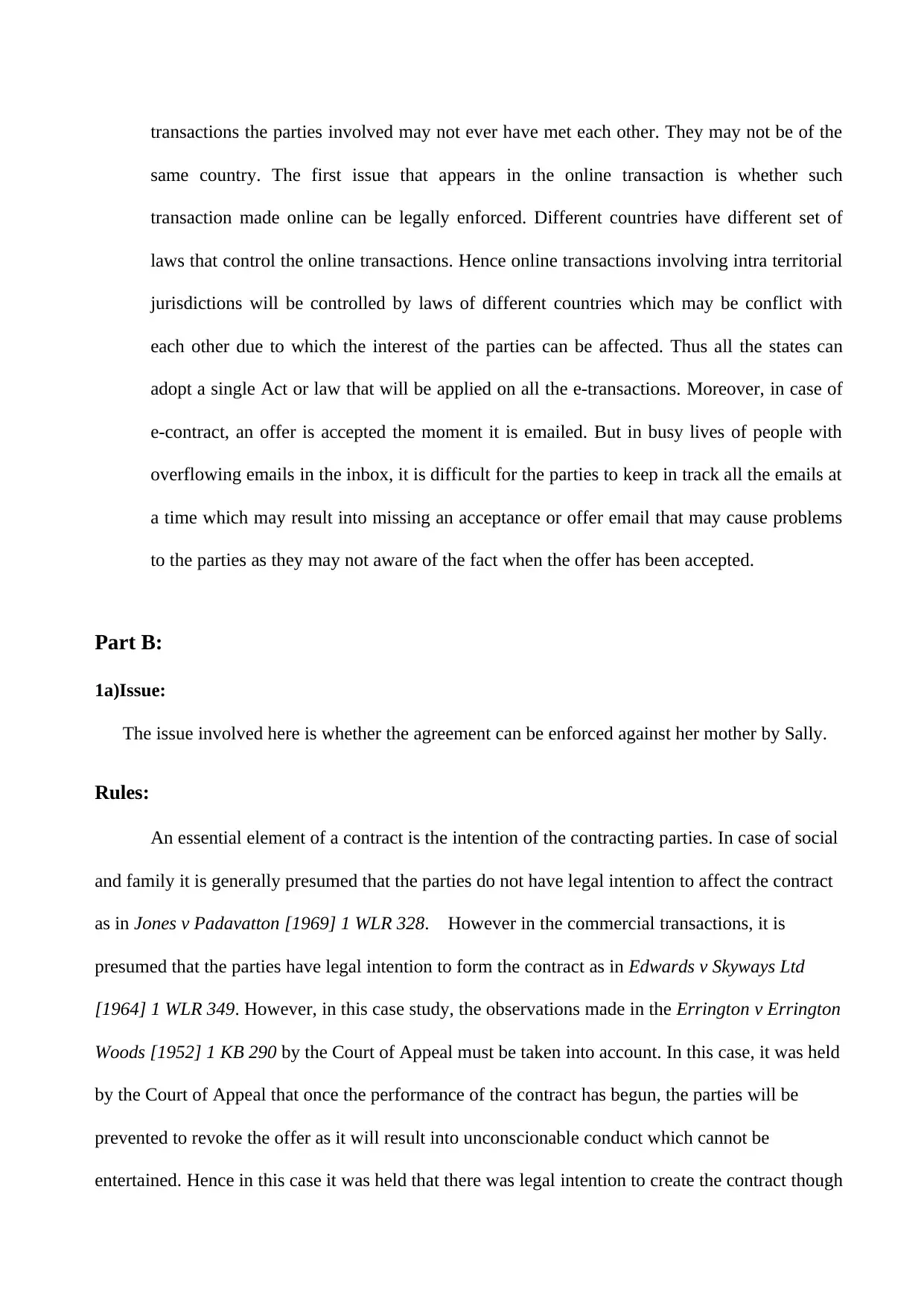
transactions the parties involved may not ever have met each other. They may not be of the
same country. The first issue that appears in the online transaction is whether such
transaction made online can be legally enforced. Different countries have different set of
laws that control the online transactions. Hence online transactions involving intra territorial
jurisdictions will be controlled by laws of different countries which may be conflict with
each other due to which the interest of the parties can be affected. Thus all the states can
adopt a single Act or law that will be applied on all the e-transactions. Moreover, in case of
e-contract, an offer is accepted the moment it is emailed. But in busy lives of people with
overflowing emails in the inbox, it is difficult for the parties to keep in track all the emails at
a time which may result into missing an acceptance or offer email that may cause problems
to the parties as they may not aware of the fact when the offer has been accepted.
Part B:
1a)Issue:
The issue involved here is whether the agreement can be enforced against her mother by Sally.
Rules:
An essential element of a contract is the intention of the contracting parties. In case of social
and family it is generally presumed that the parties do not have legal intention to affect the contract
as in Jones v Padavatton [1969] 1 WLR 328. However in the commercial transactions, it is
presumed that the parties have legal intention to form the contract as in Edwards v Skyways Ltd
[1964] 1 WLR 349. However, in this case study, the observations made in the Errington v Errington
Woods [1952] 1 KB 290 by the Court of Appeal must be taken into account. In this case, it was held
by the Court of Appeal that once the performance of the contract has begun, the parties will be
prevented to revoke the offer as it will result into unconscionable conduct which cannot be
entertained. Hence in this case it was held that there was legal intention to create the contract though
same country. The first issue that appears in the online transaction is whether such
transaction made online can be legally enforced. Different countries have different set of
laws that control the online transactions. Hence online transactions involving intra territorial
jurisdictions will be controlled by laws of different countries which may be conflict with
each other due to which the interest of the parties can be affected. Thus all the states can
adopt a single Act or law that will be applied on all the e-transactions. Moreover, in case of
e-contract, an offer is accepted the moment it is emailed. But in busy lives of people with
overflowing emails in the inbox, it is difficult for the parties to keep in track all the emails at
a time which may result into missing an acceptance or offer email that may cause problems
to the parties as they may not aware of the fact when the offer has been accepted.
Part B:
1a)Issue:
The issue involved here is whether the agreement can be enforced against her mother by Sally.
Rules:
An essential element of a contract is the intention of the contracting parties. In case of social
and family it is generally presumed that the parties do not have legal intention to affect the contract
as in Jones v Padavatton [1969] 1 WLR 328. However in the commercial transactions, it is
presumed that the parties have legal intention to form the contract as in Edwards v Skyways Ltd
[1964] 1 WLR 349. However, in this case study, the observations made in the Errington v Errington
Woods [1952] 1 KB 290 by the Court of Appeal must be taken into account. In this case, it was held
by the Court of Appeal that once the performance of the contract has begun, the parties will be
prevented to revoke the offer as it will result into unconscionable conduct which cannot be
entertained. Hence in this case it was held that there was legal intention to create the contract though
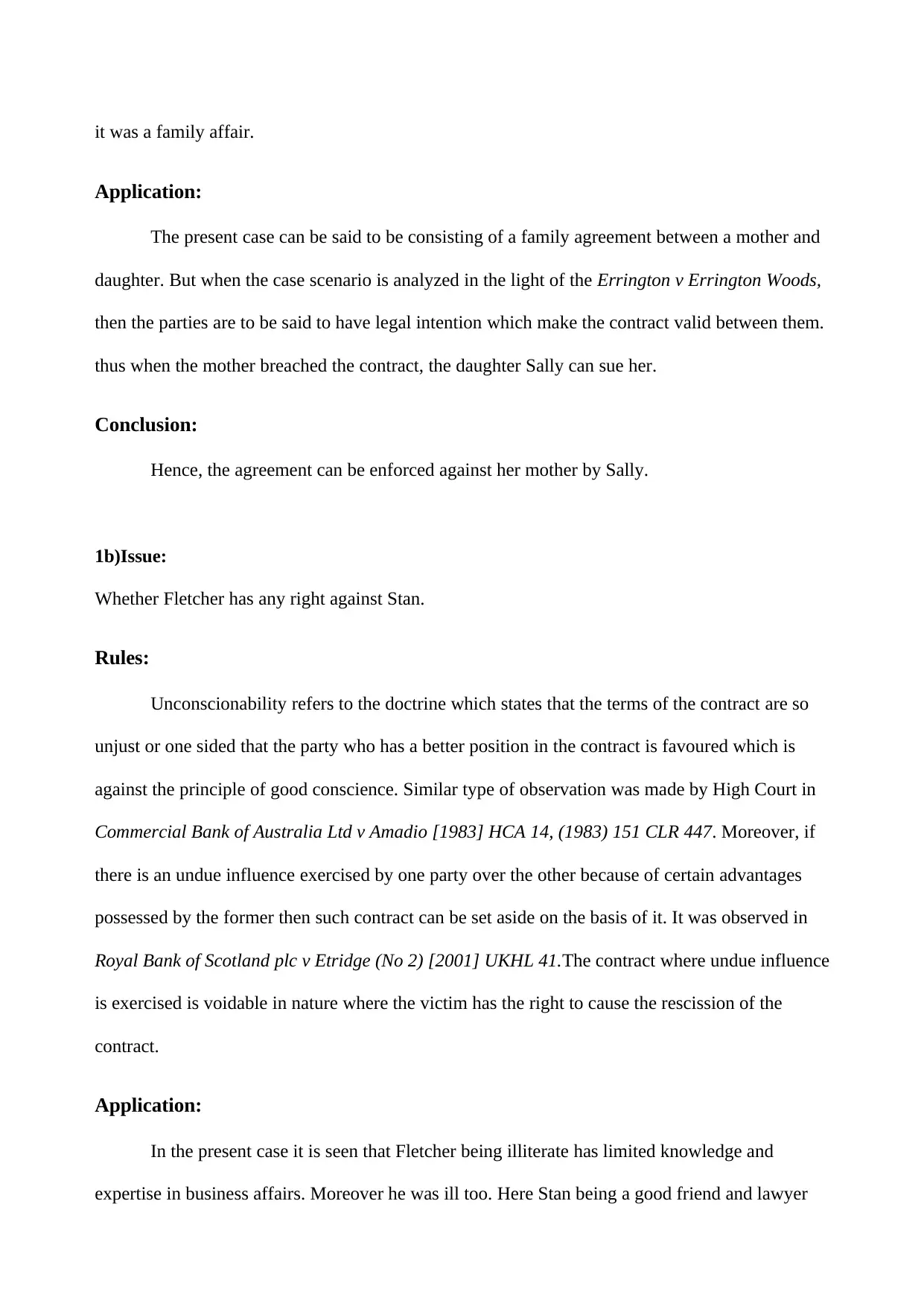
it was a family affair.
Application:
The present case can be said to be consisting of a family agreement between a mother and
daughter. But when the case scenario is analyzed in the light of the Errington v Errington Woods,
then the parties are to be said to have legal intention which make the contract valid between them.
thus when the mother breached the contract, the daughter Sally can sue her.
Conclusion:
Hence, the agreement can be enforced against her mother by Sally.
1b)Issue:
Whether Fletcher has any right against Stan.
Rules:
Unconscionability refers to the doctrine which states that the terms of the contract are so
unjust or one sided that the party who has a better position in the contract is favoured which is
against the principle of good conscience. Similar type of observation was made by High Court in
Commercial Bank of Australia Ltd v Amadio [1983] HCA 14, (1983) 151 CLR 447. Moreover, if
there is an undue influence exercised by one party over the other because of certain advantages
possessed by the former then such contract can be set aside on the basis of it. It was observed in
Royal Bank of Scotland plc v Etridge (No 2) [2001] UKHL 41.The contract where undue influence
is exercised is voidable in nature where the victim has the right to cause the rescission of the
contract.
Application:
In the present case it is seen that Fletcher being illiterate has limited knowledge and
expertise in business affairs. Moreover he was ill too. Here Stan being a good friend and lawyer
Application:
The present case can be said to be consisting of a family agreement between a mother and
daughter. But when the case scenario is analyzed in the light of the Errington v Errington Woods,
then the parties are to be said to have legal intention which make the contract valid between them.
thus when the mother breached the contract, the daughter Sally can sue her.
Conclusion:
Hence, the agreement can be enforced against her mother by Sally.
1b)Issue:
Whether Fletcher has any right against Stan.
Rules:
Unconscionability refers to the doctrine which states that the terms of the contract are so
unjust or one sided that the party who has a better position in the contract is favoured which is
against the principle of good conscience. Similar type of observation was made by High Court in
Commercial Bank of Australia Ltd v Amadio [1983] HCA 14, (1983) 151 CLR 447. Moreover, if
there is an undue influence exercised by one party over the other because of certain advantages
possessed by the former then such contract can be set aside on the basis of it. It was observed in
Royal Bank of Scotland plc v Etridge (No 2) [2001] UKHL 41.The contract where undue influence
is exercised is voidable in nature where the victim has the right to cause the rescission of the
contract.
Application:
In the present case it is seen that Fletcher being illiterate has limited knowledge and
expertise in business affairs. Moreover he was ill too. Here Stan being a good friend and lawyer
⊘ This is a preview!⊘
Do you want full access?
Subscribe today to unlock all pages.

Trusted by 1+ million students worldwide
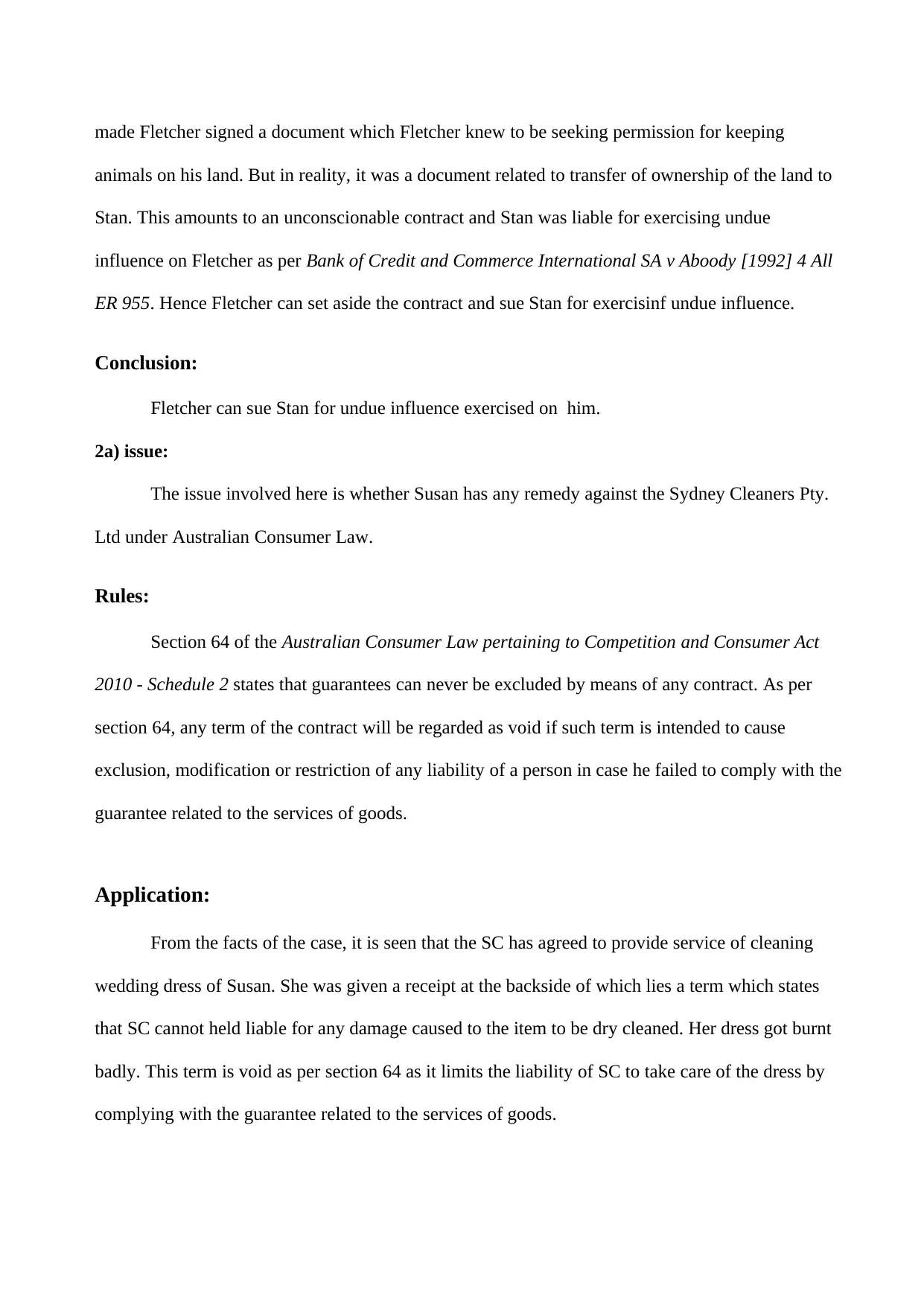
made Fletcher signed a document which Fletcher knew to be seeking permission for keeping
animals on his land. But in reality, it was a document related to transfer of ownership of the land to
Stan. This amounts to an unconscionable contract and Stan was liable for exercising undue
influence on Fletcher as per Bank of Credit and Commerce International SA v Aboody [1992] 4 All
ER 955. Hence Fletcher can set aside the contract and sue Stan for exercisinf undue influence.
Conclusion:
Fletcher can sue Stan for undue influence exercised on him.
2a) issue:
The issue involved here is whether Susan has any remedy against the Sydney Cleaners Pty.
Ltd under Australian Consumer Law.
Rules:
Section 64 of the Australian Consumer Law pertaining to Competition and Consumer Act
2010 - Schedule 2 states that guarantees can never be excluded by means of any contract. As per
section 64, any term of the contract will be regarded as void if such term is intended to cause
exclusion, modification or restriction of any liability of a person in case he failed to comply with the
guarantee related to the services of goods.
Application:
From the facts of the case, it is seen that the SC has agreed to provide service of cleaning
wedding dress of Susan. She was given a receipt at the backside of which lies a term which states
that SC cannot held liable for any damage caused to the item to be dry cleaned. Her dress got burnt
badly. This term is void as per section 64 as it limits the liability of SC to take care of the dress by
complying with the guarantee related to the services of goods.
animals on his land. But in reality, it was a document related to transfer of ownership of the land to
Stan. This amounts to an unconscionable contract and Stan was liable for exercising undue
influence on Fletcher as per Bank of Credit and Commerce International SA v Aboody [1992] 4 All
ER 955. Hence Fletcher can set aside the contract and sue Stan for exercisinf undue influence.
Conclusion:
Fletcher can sue Stan for undue influence exercised on him.
2a) issue:
The issue involved here is whether Susan has any remedy against the Sydney Cleaners Pty.
Ltd under Australian Consumer Law.
Rules:
Section 64 of the Australian Consumer Law pertaining to Competition and Consumer Act
2010 - Schedule 2 states that guarantees can never be excluded by means of any contract. As per
section 64, any term of the contract will be regarded as void if such term is intended to cause
exclusion, modification or restriction of any liability of a person in case he failed to comply with the
guarantee related to the services of goods.
Application:
From the facts of the case, it is seen that the SC has agreed to provide service of cleaning
wedding dress of Susan. She was given a receipt at the backside of which lies a term which states
that SC cannot held liable for any damage caused to the item to be dry cleaned. Her dress got burnt
badly. This term is void as per section 64 as it limits the liability of SC to take care of the dress by
complying with the guarantee related to the services of goods.
Paraphrase This Document
Need a fresh take? Get an instant paraphrase of this document with our AI Paraphraser
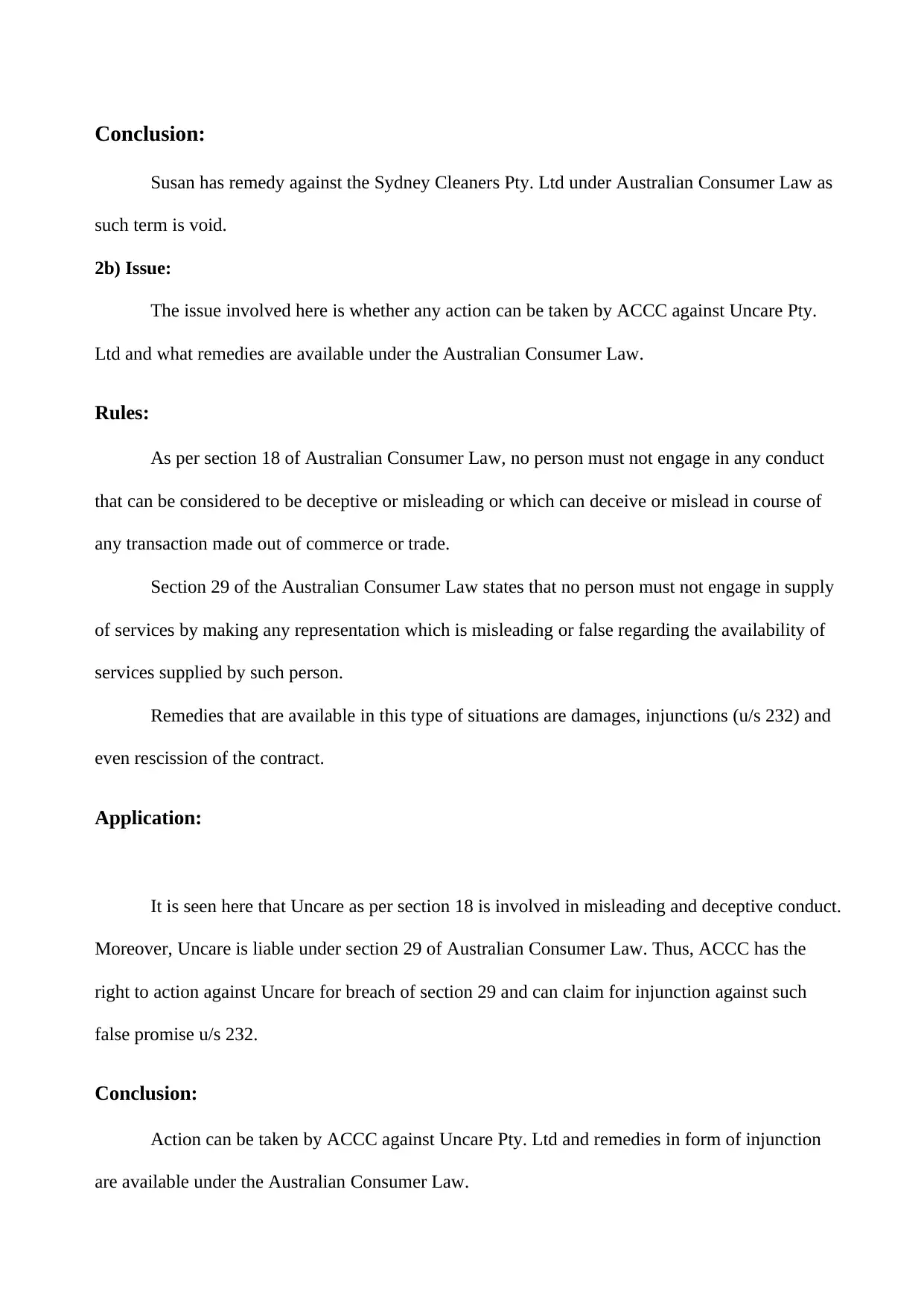
Conclusion:
Susan has remedy against the Sydney Cleaners Pty. Ltd under Australian Consumer Law as
such term is void.
2b) Issue:
The issue involved here is whether any action can be taken by ACCC against Uncare Pty.
Ltd and what remedies are available under the Australian Consumer Law.
Rules:
As per section 18 of Australian Consumer Law, no person must not engage in any conduct
that can be considered to be deceptive or misleading or which can deceive or mislead in course of
any transaction made out of commerce or trade.
Section 29 of the Australian Consumer Law states that no person must not engage in supply
of services by making any representation which is misleading or false regarding the availability of
services supplied by such person.
Remedies that are available in this type of situations are damages, injunctions (u/s 232) and
even rescission of the contract.
Application:
It is seen here that Uncare as per section 18 is involved in misleading and deceptive conduct.
Moreover, Uncare is liable under section 29 of Australian Consumer Law. Thus, ACCC has the
right to action against Uncare for breach of section 29 and can claim for injunction against such
false promise u/s 232.
Conclusion:
Action can be taken by ACCC against Uncare Pty. Ltd and remedies in form of injunction
are available under the Australian Consumer Law.
Susan has remedy against the Sydney Cleaners Pty. Ltd under Australian Consumer Law as
such term is void.
2b) Issue:
The issue involved here is whether any action can be taken by ACCC against Uncare Pty.
Ltd and what remedies are available under the Australian Consumer Law.
Rules:
As per section 18 of Australian Consumer Law, no person must not engage in any conduct
that can be considered to be deceptive or misleading or which can deceive or mislead in course of
any transaction made out of commerce or trade.
Section 29 of the Australian Consumer Law states that no person must not engage in supply
of services by making any representation which is misleading or false regarding the availability of
services supplied by such person.
Remedies that are available in this type of situations are damages, injunctions (u/s 232) and
even rescission of the contract.
Application:
It is seen here that Uncare as per section 18 is involved in misleading and deceptive conduct.
Moreover, Uncare is liable under section 29 of Australian Consumer Law. Thus, ACCC has the
right to action against Uncare for breach of section 29 and can claim for injunction against such
false promise u/s 232.
Conclusion:
Action can be taken by ACCC against Uncare Pty. Ltd and remedies in form of injunction
are available under the Australian Consumer Law.

⊘ This is a preview!⊘
Do you want full access?
Subscribe today to unlock all pages.

Trusted by 1+ million students worldwide
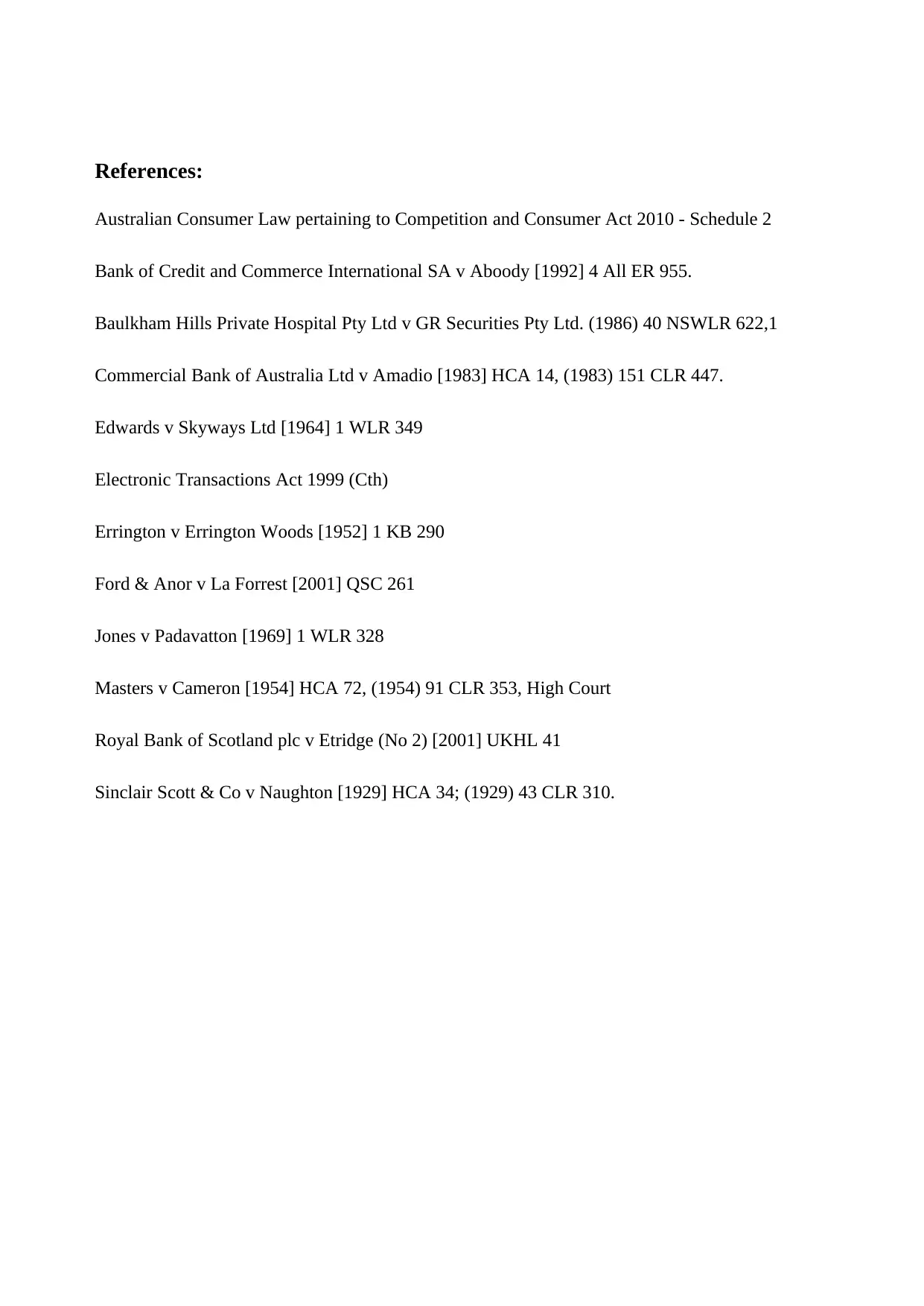
References:
Australian Consumer Law pertaining to Competition and Consumer Act 2010 - Schedule 2
Bank of Credit and Commerce International SA v Aboody [1992] 4 All ER 955.
Baulkham Hills Private Hospital Pty Ltd v GR Securities Pty Ltd. (1986) 40 NSWLR 622,1
Commercial Bank of Australia Ltd v Amadio [1983] HCA 14, (1983) 151 CLR 447.
Edwards v Skyways Ltd [1964] 1 WLR 349
Electronic Transactions Act 1999 (Cth)
Errington v Errington Woods [1952] 1 KB 290
Ford & Anor v La Forrest [2001] QSC 261
Jones v Padavatton [1969] 1 WLR 328
Masters v Cameron [1954] HCA 72, (1954) 91 CLR 353, High Court
Royal Bank of Scotland plc v Etridge (No 2) [2001] UKHL 41
Sinclair Scott & Co v Naughton [1929] HCA 34; (1929) 43 CLR 310.
Australian Consumer Law pertaining to Competition and Consumer Act 2010 - Schedule 2
Bank of Credit and Commerce International SA v Aboody [1992] 4 All ER 955.
Baulkham Hills Private Hospital Pty Ltd v GR Securities Pty Ltd. (1986) 40 NSWLR 622,1
Commercial Bank of Australia Ltd v Amadio [1983] HCA 14, (1983) 151 CLR 447.
Edwards v Skyways Ltd [1964] 1 WLR 349
Electronic Transactions Act 1999 (Cth)
Errington v Errington Woods [1952] 1 KB 290
Ford & Anor v La Forrest [2001] QSC 261
Jones v Padavatton [1969] 1 WLR 328
Masters v Cameron [1954] HCA 72, (1954) 91 CLR 353, High Court
Royal Bank of Scotland plc v Etridge (No 2) [2001] UKHL 41
Sinclair Scott & Co v Naughton [1929] HCA 34; (1929) 43 CLR 310.
Paraphrase This Document
Need a fresh take? Get an instant paraphrase of this document with our AI Paraphraser

Running head: BUSINESS LAW
1 out of 11
Related Documents
Your All-in-One AI-Powered Toolkit for Academic Success.
+13062052269
info@desklib.com
Available 24*7 on WhatsApp / Email
![[object Object]](/_next/static/media/star-bottom.7253800d.svg)
Unlock your academic potential
Copyright © 2020–2026 A2Z Services. All Rights Reserved. Developed and managed by ZUCOL.





